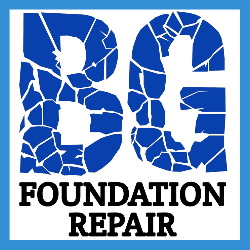FAQ
Frequently asked questions from BG Foundation Repair customers like you.
Can I just fix the crack myself?
There are many products on the market that appeal to homeowners for DIY crack repair. These products are often gimmicky and do not address the root cause of the issue. It's best to seek advice from a qualified foundation professional. BG Foundation Repair offers free estimates, and will never recommend a service you do not need.
How do I know if my problem is serious?
Common indicators of a serious foundation issue include:
- Uneven floors
- Visible gaps and separation between walls and the ceiling and/or floor
- Water intrusion and dampness
Will you have to dig or excavate outside my foundation?
For the types of services we offer, excavation is not necessary.
Do you provide structural assessments?
BG Foundation Repair does not have a structural engineer on staff; however, with many years of experience, we have the expertise to determine if the issue is structural in nature. We will always recommend a structural engineer when necessary to perform a full analysis.
Do you install sump pumps or French drains?
BG Foundation Repair does not install sump pumps or French drains; however, these systems are often expensive, and may not actually address the root cause of your issue.
I have water coming through my stone foundation. Do I have to dig it out?
No — waterproofing fieldstone foundations is best done by addressing the grade of the property around the home, and the gutters, downspouts, and drains. Repointing mortar in between the stones is necessary for keeping your foundation tight and strong. A waterproofing masonry material can be added to the interior, but it is still always recommended to address the exterior as a priority.
Should I epoxy over my entire basement/garage floor?
Epoxy or paint on floors has a tendency to peel and deteriorate the concrete slab by trapping moisture beneath. You can do this, but it is best to ensure that your slab does not have a moisture problem. BG Foundation Repair offers solutions for excessive dampness in concrete.
I have a cinder block foundation that's bowing. What do I do?
Bowing walls are often a sign of hydrostatic pressure, and are best addressed as soon as you notice any bowing. It is important to make sure there are no areas where water is pooling around the exterior of your home. Contact BG Foundation Repair immediately if you are experiencing a bowing wall in your home.

